KNOWLEDGE
What is Ocean-Bound Plastic (OBP)?
Accounting for over 70 percent of the surface area of planet Earth, oceans play a crucial role in the health of our ecosystem— including land animals and humans. Therefore, ocean pollution is a critical environmental issue that poses a severe threat to the health and well-being of our planet.
Unfortunately, the oceans are filled with billions of pounds of trash, most of which is plastic waste. Therefore, recycling ocean-bound plastic can help reduce the amount of pollution in our oceans and protect marine life.
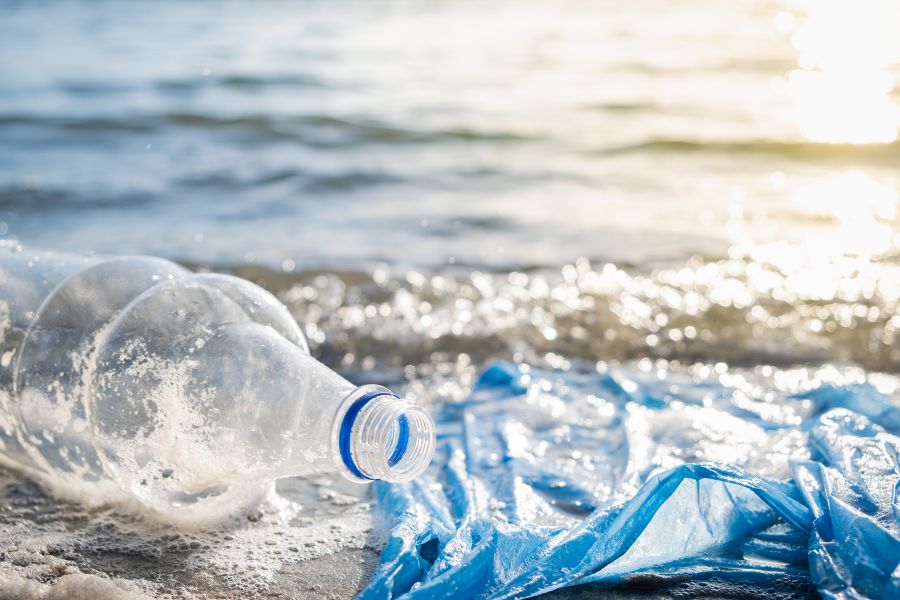
So, what is ocean-bound plastic? And what sustainable initiatives can you take to reduce the overwhelming amount of plastic polluting our oceans? Read on to learn more.
What is Ocean-Bound Plastic?
Ocean Bound Plastic (OBP) is a type of plastic waste that is “at risk of ending up in the ocean.” OBP is “abandoned plastic waste” consisting of microplastics, mezzo-plastics, and macro-plastics left within 30 miles (or 50 km) of the ocean in coastal areas with poor waste management systems. It is estimated that OBP contributes around 80% of all plastic marine litter. While most OBPs originate within 30 miles of the coastline, they can also come from more inland locations. This is because water, including rivers, can pick up and carry plastic waste to the ocean. The environmental impact of ocean-bound plastics is an issue that everyone should be aware of and attempt to mitigate, regardless of whether or not you reside in coastal communities.
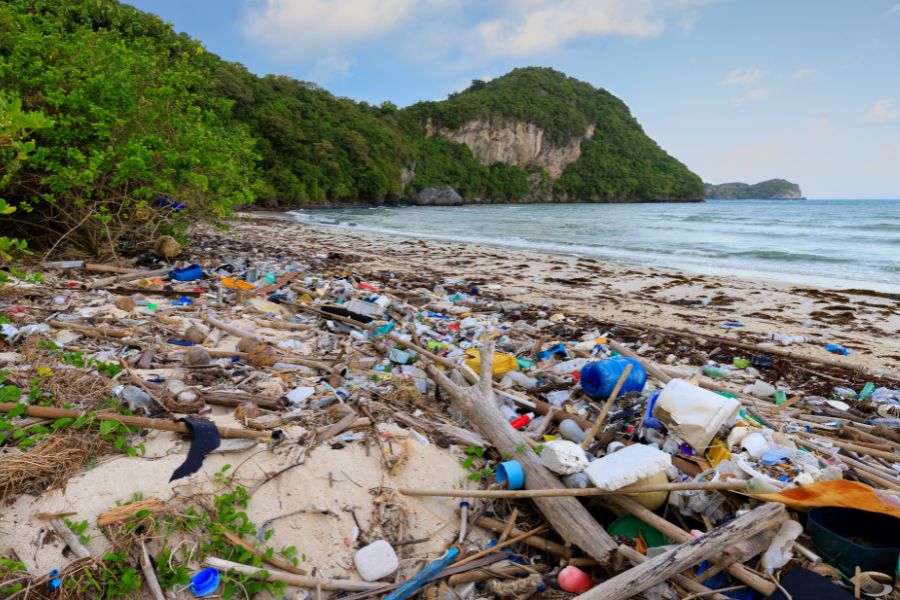
The Growing Problem of Plastic Pollution in the Oceans
Plastic pollution has become a huge problem in our global oceans and waterways. In fact, research shows that we could have more plastic than fish in the oceans by 2050.
When plastic waste from informal dump sites reaches the ocean, it breaks down into microplastics that disrupt underwater ecosystems. To combat this ocean plastic problem, it’s imperative to intercept plastics before they can enter coastal environments and waterways.
Common Types of Ocean-Bound Plastic
Ocean bound plastic can include anything from discarded food containers to plastic bottles littered on the ground instead of responsibly disposed of in a recycling bin, much to the chagrin of environmental activists. Some of the most common types of ocean-bound plastic include:
-
Single-use plastics: Single-use plastics such as straws, disposable cutlery, and plastic bags contribute significantly to the plastic footprint and waste problem in our world. While often used for a short time, these products will eventually make their way into the ocean, contributing to our global plastic waste problem.
-
Abandoned fishing gear: Plastic bycatch and fishing gear, such as nets and lines, often contain plastic. When lost or discarded at sea, they cause plastic pollution.
-
Industrial plastic waste: Poor waste management and lack of infrastructure, especially around coastal regions and major population centers, are major contributors to plastic pollution near our coastlines.
Waterways as far as 120 miles away can serve as a direct path for plastic waste to move from inland areas to the ocean.
As a business, it is your responsibility to consider the post-consumer plastic waste from your products and how you can still aim to make a positive impact on the environment, even if your products incorporate a plastic component or plastic material. Understanding the different types of ocean-bound plastics can help you implement sustainable solutions across your product’s lifecycle and even consider ways to give a second life to your product packaging.
Why You Should Care About OBP
In addition to providing homes to hundreds of thousands of marine species, oceans regulate the climate, provide food, and generate 50% of the oxygen we need to survive. The impacts of OBP are far-reaching and complex, affecting not only the environment but also human health and livelihoods. Addressing ocean-bound plastic is a big step towards ensuring cleaner oceans and a healthier planet.
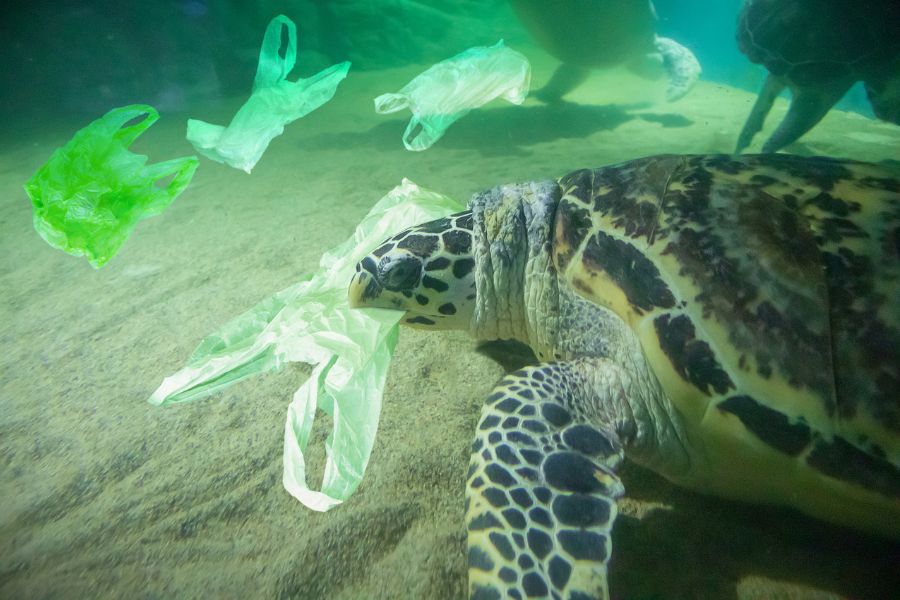
Impacts Associated with Ocean-Bound Plastic
Ocean-bound plastics harm marine life and ecosystems. However, the damage caused goes beyond the aquatic ecosystem. Here are some of the impacts associated with ocean plastic.
Environmental Impacts
1. Marine Debris
Plastics can take hundreds of years to decompose, so they spread and converge in the ocean, where currents meet. This creates a massive island of plastic floating on the ocean’s surface. Additionally, plastics break into smaller parts, which can sink lower into the ocean and spread throughout the sea column.
With that, plastic waste will restrict the flow of oxygen and block the sun’s rays from reaching aquatic plants that utilize it to create nutrients. This disrupts the entire marine food chain, threatening the existence of marine life.
2. Habitat Destruction
Ocean plastic infiltrates the marine ecosystem, causing lasting damage to marine life, whether large or small. The large plastic materials can capture and entangle marine animals, leading to injury and predator vulnerability. Marine animals can also ingest plastic debris, which can lead to suffocation, starvation, drowning, and fatal intestinal punctures or blockages. Additionally, discarded fishnets can smother and break coral reefs, preventing the healthy growth of an already highly compromised ecosystem.
Social and Economic Impacts
1. Economic Losses
The ocean is a vital resource, providing livelihoods for 3 billion people and supporting 57 million jobs globally in marine fisheries. However, over 60% of major marine ecosystems are being used unsustainably, leading to significant degradation. According to UNEP, plastic pollution in our oceans is estimated at 11 million tons annually and costs an estimated US $13 billion in cleanup costs and losses to fisheries and other ocean-based industries. Urgent action is needed to stop polluting the ocean and ensure long-term sustainability.
2. Public Health Concerns
The contamination of ocean waters with plastic poses significant risks to human health through the consumption of seafood. Plastic debris in the ocean is often mistaken for food by sea animals, and the chemicals present in the plastic, as well as other toxins absorbed from the environment, can accumulate in these animals. Consuming seafood contaminated with these chemicals can lead to various health issues, including childhood development problems, congenital disabilities, cancer, immune system disorders, and organ damage.
Additionally, unsustainable and destructive fishing practices contribute to the depletion of marine biodiversity and result in over ten million metric tons of fish wasted annually. This threatens the global food supply, as the ocean provides 15% of the animal protein consumed worldwide, and in less developed countries, seafood serves as the primary source of protein for more than half of the population. If significant changes are not implemented, UNESCO predicts that more than 50% of marine species could face extinction by the year 2100.
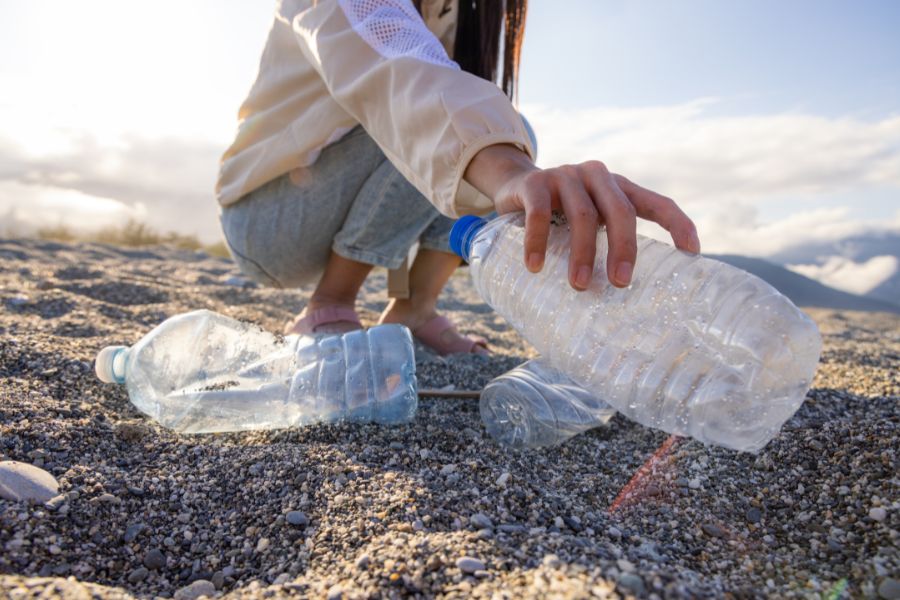
Addressing OBP in Your Day-to-Day Packaging Operations
As ocean plastic pollution reaches alarming levels, our oceans are in dire need of our intervention. By implementing sustainable practices in your packaging operations, you can make a significant contribution to protecting marine ecosystems and biodiversity. Moreover, consumers are increasingly expecting brands to take action on plastics, including OBP’s. Embracing sustainable packaging strategies can not only benefit the environment but also drive sales, foster customer loyalty, and provide a competitive advantage. Here are some practical ways to adopt sustainable practices in your day-to-day packaging operations:
Reduce Plastic Usage
The most effective way to address OBP is to focus on preventing the problem at its source. Take measures to minimize plastic usage in your company. If you require plastic bottles, can you use less plastic in production so that it can break down faster and be recycled more easily? If you’re using virgin plastic, incorporating PCR recycled plastic material into your packaging will be a sustainable way to continue to use plastic.
Choose packaging solutions that are sustainable, biodegradable, compostable, recyclable, or reusable. Some environment-friendly packaging solutions may include:
- Algae-Based Packaging
- Agricultural Byproduct Packaging
- Edible Coatings
- Water-Soluble Films
- Compostable Packaging
Generally, eco-friendly packaging materials can be crafted from biodegradable plastics or various plant-based materials that break down and leave no harmful chemicals behind. Unlike plastics, eco-friendly packaging solutions can be easily disposed of or repurposed without endangering marine life. Reducing plastic usage helps minimize plastic leakage into the natural environment, protecting oceans from becoming overrun with plastic waste.
Practice Responsible Sourcing
Responsible sourcing involves prioritizing environmentally friendly suppliers and products. This may include having clear environmental sustainability requirements that your suppliers must meet. You can then work closely with your suppliers to identify alternative eco-friendly packaging solutions to incorporate into your everyday supply chain operations. Focusing on more sustainable sourcing is not only a strategic business decision but also encourages your suppliers to adopt eco-friendly solutions. It’s also a good idea to look at where you are sourcing your product from. If you’re having glass imported from overseas, you will likely be able to find an equally sustainable option available domestically and perhaps even locally, significantly cutting down your carbon emissions from transport.
Improving Waste Management
Plastic waste can easily end up in the ocean due to inadequate infrastructure and poor waste management practices. Implementing effective waste management strategies can significantly reduce the amount of plastic that enters the marine environment. Here are some measures that can be taken to improve waste management:
-
Conduct a waste audit: To manage waste effectively, you must audit your company’s waste and find areas for improvement. This includes knowing how much waste you produce and assessing your current waste disposal patterns. By comprehensively assessing your waste, you can make informed decisions that achieve environmental sustainability.
-
Implement recycling infrastructure: A robust composting and recycling infrastructure helps reduce the amount of waste sent to landfills. This includes setting up recycling stations and other waste-processing facilities to reduce littering.
-
Separate waste: Separating waste helps ensure that recyclable materials are identified and adequately managed. You can have separate disposal facilities for different recyclable materials, including plastic, paper, and glass. This helps determine your various waste streams, increasing the amount and quality of recycling.
Improving waste management within your organization’s supply chain can help reduce waste, conserve resources, help protect marine ecosystems, and create a cleaner and healthier environment.
Promote Consumer Education
Consumer education and targeted awareness campaigns are essential to ensure the long-term management of ocean-bound plastics. Organize community events, workshops, or targeted campaigns to guide consumers on proper disposal methods for your product.
Alternatively, print the information directly on the packaging to foster a culture of environmental responsibility, recycling, and reuse among consumers.
Consumer education can also encompass informing the public about alternative ways to reuse product packaging or how to recycle products effectively. Educate the public about the detrimental effects of ocean-bound plastics to encourage sustainable lifestyles, increased recycling, and proper disposal of plastics after use.
Engage with OBP Initiatives
Multiple local, regional, and international initiatives exist to reduce ocean-bound plastic pollution on land. Zero Plastic Oceans is a non-governmental organization established to combat plastic pollution, specifically addressing ocean-bound plastic. While many organizations only collect OBP for recycling, Zero Plastic Oceans created the Ocean Bound Plastic Certification Program to ensure proper collection and management of plastic waste. The program helps encourage the removal of OBP from the environment and provides a certification framework that incentivizes proper collection, treatment, and recycling of plastic waste. Participating in such a program helps ensure that all OBP is removed. It focuses on traceability and transparency throughout the supply chain, allowing you to keep track of your plastic waste easily.
OBP initiatives also promote large-scale mass media education campaigns, conduct cleanups of existing OPs, and help reduce littering around shores. Additionally, it would help to stay up-to-date with packaging trends. This can help you redefine your packaging solutions with innovative packaging trends that are more eco-friendly.
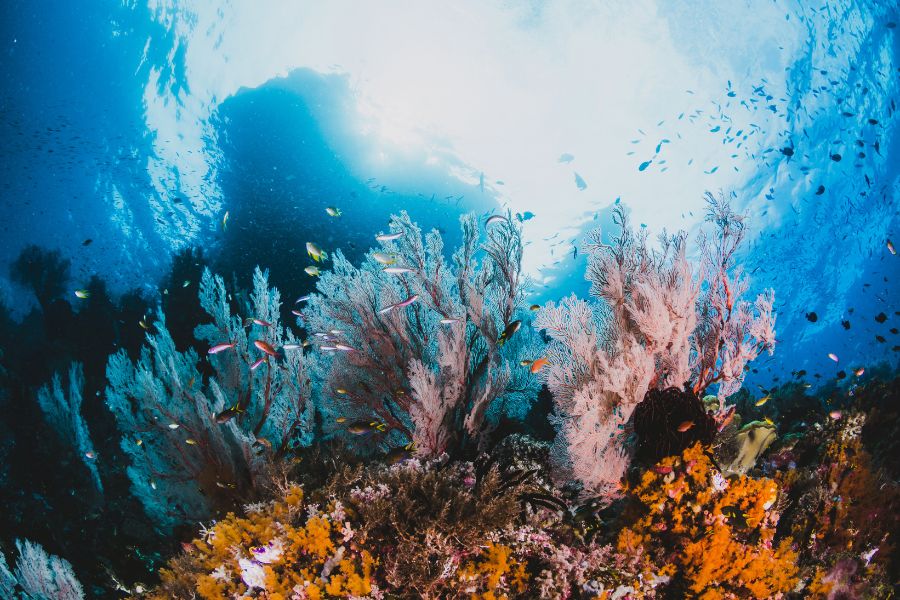
Start Contributing to a Cleaner Packaging Future
Our oceans are a vital source of life and a precious resource facing irreparable damage from ocean-bound plastics. That’s why addressing OBPs is not just an environmental imperative but a collective responsibility. More and more companies are adopting eco-friendly practices to protect the planet. With a few changes in your supply chain, you too can join the campaign to reduce the amount of pollution going into our oceans.
At Paramount Global, we are committed to empowering businesses like yours with eco-friendly packaging and efficient supply chain solutions. From expert sourcing to packaging design and inventory management, we are your partner all the way through. Together, we can streamline your packaging operations, create a positive impact on the environment, and build a better future for all. Contact us today to discover how we can be a partner for you.
Hayley is a marketing professional and copywriter with a background in crafting content for a diverse range of industries. She has been writing about packaging and supply chain logistics for Paramount Global since 2022. She specializes in explaining complex topics in a clear and engaging way and is an advocate for sustainability in packaging and supply chain management.
Read More
For over forty years, Paramount has been delivering perfectly integrated packaging and supply chain solutions.
